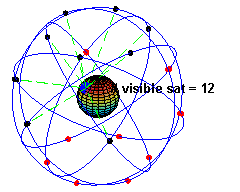 First off, let's get a few things straight. GPS works by using a constellation of about 30 medium earth orbit (MEO) satellites run by the US military which go whizzing around the earth twice every day at a height of 20,000 km to transmit position and time information to receivers on the ground. From this information GPS receivers then can work out where they are. This means that the only person who knows your location is you - there is no path back to the satellite which somehow covertly tells the satellite where you are.
First off, let's get a few things straight. GPS works by using a constellation of about 30 medium earth orbit (MEO) satellites run by the US military which go whizzing around the earth twice every day at a height of 20,000 km to transmit position and time information to receivers on the ground. From this information GPS receivers then can work out where they are. This means that the only person who knows your location is you - there is no path back to the satellite which somehow covertly tells the satellite where you are. Thus GPS devices in themselves can not be used to 'track' the location of users. What they do provide is location information which could then be sent on via some other (radio) connection to enable someones location to be tracked. Standard in-car navigation systems do not have such a facility built in and thus using one does not alert the authorities (or anyone else for that matter) to your location.
That aside, there are in increasing number of uses to which GPS is being put in which the location information it provides is used for control purposes. For example, there are anti-social behaviour tags which monitor the location of offenders and send a signal to the local police or council if the person wearing it goes outside a pre-determined area (or indeed goes inside a particular area).
Similarly, knowing where a vehicle is (for example by sending the GPS location back to a central point via a GSM phone) can be used for road toll or car insurance calculation. There is therefore a growing 'demand' for devices which can stop the GPS receiver working so that the location information for tracking people or cars is not available. Such devices are known as GPS jammers and work in much the same way as the jammers used by various governments to stop international broadcasters.
 The most basic GPS jammers operate by producing a high power signal on the main frequency used by GPS receivers, strong enough to ensure that the GPS receiver can no longer hear the (very weak) signals from the GPS satellites and therefore thinks it has lost them and stops working. However, receiver manufacturers have gotten wise to such wheezes and have managed to find ways to overcome this 'carrier' jamming. More sophisticated jammers closely mimic the GPS signal so that not only is the receiver overwhelmed by the local interference but it becomes far more difficult to overcome the jamming as it looks just like a valid GPS signal.
The most basic GPS jammers operate by producing a high power signal on the main frequency used by GPS receivers, strong enough to ensure that the GPS receiver can no longer hear the (very weak) signals from the GPS satellites and therefore thinks it has lost them and stops working. However, receiver manufacturers have gotten wise to such wheezes and have managed to find ways to overcome this 'carrier' jamming. More sophisticated jammers closely mimic the GPS signal so that not only is the receiver overwhelmed by the local interference but it becomes far more difficult to overcome the jamming as it looks just like a valid GPS signal.The problem, though, with such jammers is that they don't just wipe out GPS reception by the receiver they are intending to interrupt, but can knock out GPS reception over quite a wide area. Even basic, low power devices (which typically use transmitter powers of around 10 milliWatts) can produce signals strong enough to stop GPS receivers working over a range of several hundred metres. More powerful devices (and there are some easy to get hold of devices which put out a Watt or more) can cause problems for GPS receivers over ranges of over a mile. So without knowing it, someone trying to defeat the GPS monitoring device put in their company car to monitor their movements can unintentionally end up causing aircraft or ships to not be able to identify where they are either.
Now, of course, GPS jammers are illegal to use as they intentionally cause interference which is not just unlawful in that you generally need a licence for any radio transmitter, but that causing harmful interference is a particularly scandalous deed. The problem of GPS jammers is well recognised by the authorities and the impacts of their use so severe that they are one of the very few devices that organisations such as eBay have been asked to stop the selling of on their web-site (try searching there for 'GPS jammer' and you won't find a single one on offer). However, there are ways and means of getting hold of them and like anything that is useful in a 'getting out of paying for something' or 'getting around the law' way, it's almost certain that their sale will continue with devices popping up from new suppliers as the authorities crack down on sellers one by one.
 Whilst all this might sound a bit like scaremongering, with aircraft falling out of the sky, that's not the real problem (aircraft don't crash just because they lose their GPS signal). Earlier it was mentioned that GPS satellites transmit both position and time information. The time information is used for a very wide range of applications, from synchronising digital transmitter networks, to ensuring that trades on the stock market are correctly time-stamped. Imagine if these timing signals were lost - TV transmitters would fail and the stock market would come crashing down, so no Coronation Street and no hefty bonuses for city workers (whilst the last of these might not seem too severe, losing Coronation Street would be a national crisis).
Whilst all this might sound a bit like scaremongering, with aircraft falling out of the sky, that's not the real problem (aircraft don't crash just because they lose their GPS signal). Earlier it was mentioned that GPS satellites transmit both position and time information. The time information is used for a very wide range of applications, from synchronising digital transmitter networks, to ensuring that trades on the stock market are correctly time-stamped. Imagine if these timing signals were lost - TV transmitters would fail and the stock market would come crashing down, so no Coronation Street and no hefty bonuses for city workers (whilst the last of these might not seem too severe, losing Coronation Street would be a national crisis). GPS jammers have been described as a 'clear and present danger' and much is being done to try and minimise both their availability and their impact, but it seems their use will continue, and most likely continue to grow. If you feel like popping out and buying one for any reason, think again, you might as well drop a teaspoon of polonium-210 in your local neighbourhood resevoir - the consequences of both for society may not be that far apart!
1 comment
( 1817 views )
| permalink
| 



 ( 2.9 / 71733 )
( 2.9 / 71733 )




 ( 2.9 / 71733 )
( 2.9 / 71733 )

